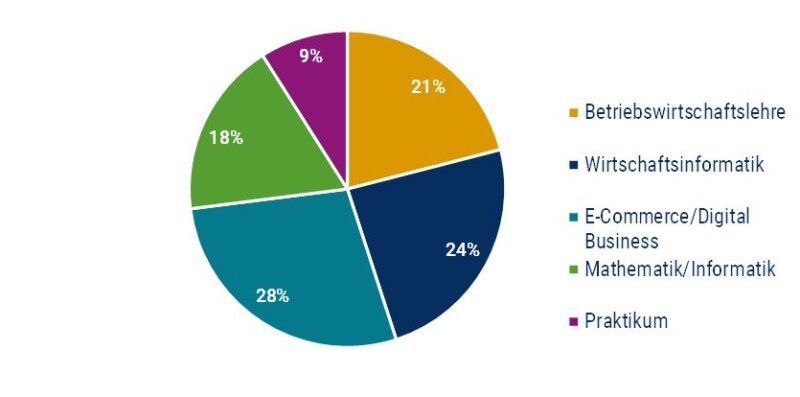- Degree
- Bachelor of Science
- Admission restriction
- without admission restriction (without NC)
- Duration
- 6 Semesters
- Credits/ECTS
- 180
- Teaching language
- German
- Tuition fee
- None
- Semester contribution
- € 272,65
- Start of studies
- Winter semester, Summer semester
- Part-time possible
- No
- Institutions
- Faculty of Economics and Business Administration
- Economics chairs
You can complete the internship either before the start of your studies, during the semester break or during the semester (by applying for a semester off). By the way: A Mathematics bridge course takes place in preparation for your studies. Participation is strongly recommended for all students.
In the Bachelor's degree programme »Economics«, you can choose from eight study profiles - depending on the subject area|field in which you would like to specialise: Regular Profile, Business Administration, Economics, E-Commerce & Digital Business (Business Information Systems), Business Analytics (Business Information Systems), Business and Economics Education I and Business and Economics Education II. If required, the study profile can be changed during the course of the degree programme without changing subject. For this reason, we do not offer specialised degree programmes, but rather study profiles under the common umbrella of the Bachelor's degree programme »Business Studies«.
You can find more detailed information in the module catalogueExternal link for the degree programme.
-
University entrance qualification
A university entrance qualification, such as a general secondary school leaving certificate, is required for admission onto the study programme.
More information on university entrance qualifications can be found here.
-
Language requirements
Admission and language requirements for applicants of foreign nationality and without German Abitur: www.uni-jena.de/en/study-orientation-international
Room 4.97
Carl-Zeiß-Straße 3
07743 Jena
Google Maps site planExternal link
Opening hours:
Monday - Friday 08:30a.m. - 11:30a.m.
Carl-Zeiß-Straße 3
07743 Jena
Google Maps site planExternal link
Opening hours:
Monday: closed
Tuesday: 08.30 to 11.30
Wednesday: 14.00 to 16.00
Thursday: 08.30 to 11.30
Friday: 08.30 to 11.30
Room 4.131
Carl-Zeiss-Str. 3
07743 Jena
Google Maps site planExternal link
Room 4.128
Carl-Zeiß-Straße 3
07743 Jena
Google Maps site planExternal link
University Main Building / SSZ
Fürstengraben 1
07743 Jena
Google Maps site planExternal link
Office hours:
We offer consultations in person, by telephone, and via Zoom. You can make an appointment by calling us on +49 3641 9-411111 (Mondays to Fridays from 9:00 to 11:00) or outside these office hours on +49 3641 9-411200. You can also use our remote help desk.
Consultation hours:
Mondays, Tuesdays, Thursdays and Fridays (9:00 to 12:20), Tuesdays (14:00 to 18:00), and Wednesdays and Thursdays (14:00 to 16:00).
Video chat: To the video chat – Zoom Videochat ZeitenMondays to Fridays (12:30 to 13:00) Password ZSB2020 Data protection informationpdf, 101 kb
University Main Building, Room E065
Fürstengraben 1
07743 Jena
Google Maps site planExternal link
Opening hours:
Mondays (10:00 – 12:00)
Tuesdays (13:00 – 15:00)
Wednesdays (10:00 – 12:00)
Thursdays (13:00 – 15:00)
Fridays (10:00 – 12:00)
You can also use our remote help desk at
www.uni-jena.de/service-ssz
or send us your enquiries by post.
Telephone hours:
Mondays to Fridays
(9:00 – 11:00)
Postal address:
Friedrich-Schiller-Universität Jena
Studierenden-Service-Zentrum
07737 Jena
University Main Building
Fürstengraben 1
07743 Jena
Google Maps site planExternal link

